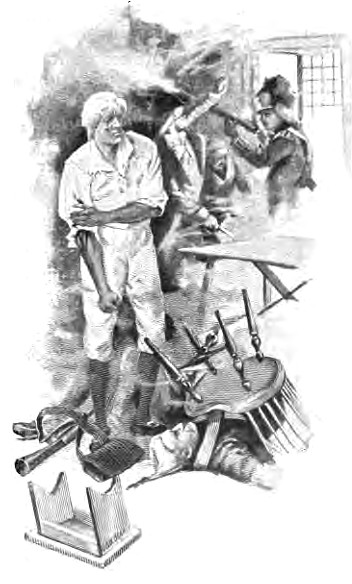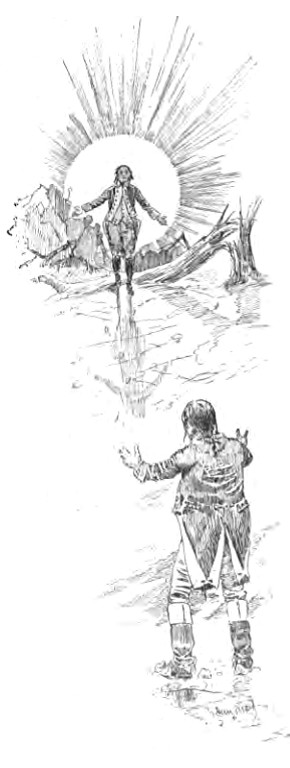| Web
and Book design,
Copyright, Kellscraft Studio 1999-2009 (Return to Web Text-ures) |
 (HOME)
|
XVlI. A HAlRBREADTH ESCAPE.
GENERAL PELEG WADSWORTH, who was born in Duxbury, Massachusetts, and was graduated from Harvard College in the class of 1769, raised a company of minutemen immediately after the battle of Lexington, and was the second officer of the expedition sent against 'Biguyduce, the old fortress that had so much to do with the fortunes of Maine from the beginning. A strong fort had been built there by the British, that they might command the entire valley. Mowatt, the ruthless destroyer of Falmouth, had been assigned to the 'Biguyduce station, with a fleet of three war ships. The General Court of Massachusetts sent an expedition, consisting of nineteen armed vessels and twenty-four transports, to capture the fort. The fleet carried three hundred and forty-four guns and an abundance of all needful munitions of war. But the enterprise proved a total failure, owing, it was thought, to the lack of skill of its commander. The land force, under the command of Generals Lovell and Wadsworth, was managed very ably, but there was no adequate support from the fleet. The garrison had an opportunity to send to Halifax for aid, and a formidable fleet of British vessels entered the harbor on the 14th of August, and practically annihilated the American fleet. It was a most humiliating defeat, and the commander was pronounced incapacitated from ever after holding a commission in the service of the state; but Generals Lovell and Wadsworth were relieved from any share of blame. The vessels of the American fleet having been all captured or burned, the marines were forced to retreat through the wilderness to the Kennebec, suffering great hardships on the way. The General Court sent three hundred soldiers to the protection of Falmouth, two hundred to Camden, and a hundred to Machias. The command of this eastern division was assigned to General Wadsworth, whose headquarters were at Thomaston. The general lived in a secluded place, on the banks of a little stream, in Thomaston. Six soldiers guarded the family, which consisted of General Wadsworth, his wife, a son of five, a baby daughter, and a Miss Fenno, a friend of Mrs. Wadsworth. It became known to the English at 'Biguyduce that the general was but feebly defended, and Lieutenant Stockton was sent, with a party of twenty-five men, to capture him. It was in the dead of winter and bitterly cold. The English soldiers reached General Wadsworth's house at midnight. When the sentinel rushed into the house to give the alarm, the soldiers discharged a volley of bullets through the open door. They surrounded the house, smashed the windows, and battered down the doors, and fired into the sleeping rooms of the family. General Wadsworth, armed with a brace of pistols and a flintlock musket, fought bravely and fiercely. But defense was hopeless against so many. Driven to close quarters, the general defended himself with a bayonet until he was shot through the arm rendered helpless, and obliged to surrender. A brutal soldier would have shot him down if an officer had not pushed aside the gun.  So fierce had been the contest that nearly all the guard were wounded, as well as the general, one being in such torture from a wound that he begged to be shot. Fortunately, not one of the women or children was struck by the hailstorm of bullets. The general had sprung from his bed, and had no time to dress himself. After his surrender one of the English officers went into his room with a lighted candle and helped him to dress. His wound was so painful that he was unable to wear his coat, and a blanket was thrown over him to protect him from the extreme cold. His wife was not allowed to examine or dress the wound, but a handkerchief was bound about it to stay the flow of blood. The house was on fire, and the general, as he was hurried away, had to endure not only the pain of his wound, but the greatest anxiety for the fate of his family. His little son was missing, but was afterwards discovered to have buried himself in the bedclothes, where he was quite safe from the flying bullets. Two of the wounded British soldiers were placed upon General Wadsworth's horse, while he, although weak from loss of blood, was forced to walk. After struggling along for a mile, his strength failed him utterly, and they left one of the wounded soldiers, who was apparently dying, at a house by the way, and placed the general upon the horse, behind the other soldier. When they reached the shore off which the vessel, an English privateer, lay at anchor, the captain cried out to the general furiously: "You accursed rebel, go and help them launch the boat, or I will run you through with my sword!" General Wadsworth answered with dignity: "I am a prisoner, wounded and helpless. You may treat me as you please." But Lieutenant Stockton was less of a brute than this. He promptly silenced the fellow, assuring him that his conduct should be reported to his superiors. "The prisoner is a gentleman," he said. "He has made a brave defense. He is entitled to be treated honorably." Upon the vessel General Wadsworth was given a berth and made as comfortable as was possible under the circumstances. The vessel reached 'Biguyduce the next day, and the prisoners were greeted upon the shore by a throng of British officers, sailors, and soldiers, with shouts of rage and scorn. They had to be protected by a guard from the violence of the British mob, as they were marched half a mile to the fort. But once there, General Wadsworth was very kindly treated, having his wounds dressed by a surgeon. General Campbell, commander of the fort, expressed great admiration of the defense that General Wadsworth had made against such heavy odds, and assured him that the captain of the privateer who had insulted him should make him a suitable apology. He dined at the commandant's table, was given a comfortable room, and was supplied with books and writing materials. There was an encampment of American soldiers at Camden, and Lieutenant Stockton sent for him to that station, only four miles from the place where he had been taken prisoner, a letter to his wife, and another, under a flag of truce, to the governor of Massachusetts. Within two weeks he learned that his family was safe. It was five weeks before he was able to move. He asked permission to leave the fort on his parole, but this, although a customary privilege, was denied him. After he had been a prisoner for two months his wife and Miss Fenno were allowed to visit him. He discovered, about that time, that he was to be sent to England to be tried as a rebel. Such was the brutality with which the British were now treating their American prisoners that being sent to England meant, almost certainly, being sent to the gallows. His companion on this unhappy journey was to be Major Benjamin Burton, who had been recently captured, and was imprisoned in the same room with General Wadsworth. Major Burton was a brave man, and by his courage had especially aroused the animosity of the British officers. To him, as well as to General Wadsworth, transportation to England would mean consignment to the gallows. In this desperate situation they formed a desperate plan of escape. They were in a grated room within the fort, and guards were stationed at their door. The walls of the fort, twenty feet high, were surrounded by a ditch. Sentinels were posted upon the walls and outside the gates of the fort. Beyond the ditch were more guards, who patrolled through the night. The fort was built upon a peninsula, and a picket guard was placed at the isthmus, the only point where escape to the mainland was possible. General Wadsworth was familiar with everything in and around 'Biguyduce, and he knew the odds they would have to encounter; but feeling their situation to be hopeless unless they could escape, the prisoners took their one desperate chance to do so. Their room had a pine-board ceiling, and in some way they had become possessed of a penknife and a gimlet. Working with these early and late, whenever it was possible to do so and avoid detection, in three weeks they had cut out a panel in the ceiling large enough for a man to crawl through. To conceal each cut as it was made, they covered it with a paste made of bread moistened in their mouths. When the aperture was large enough they were forced to wait, in sore suspense, for a night of favoring darkness and rain.  On the 18th of June the night came. The storm began with thunder and lightning. At midnight there was a furious gale, with floods of rain, and even the sentinels sought shelter. The prisoners removed the panel which they had cut out, and then lifted themselves up through the aperture into an entryway above. They groped their way along in utter darkness, and before long, unfortunately, became separated. Wadsworth at length reached the top of the wall, having made his way, providentially, into a path used by the soldiers. Fastening the blanket which he had brought with him to a picket, he lowered himself until he could safely drop into the ditch. In the howling wind and beating rain he crept cautiously along between the sentry boxes, and reached in safety the open field. On the shore of the back cove was an abandoned guardhouse, where the two friends had agreed to meet if they should become separated. General Wadsworth made his way in the darkness, over rocks and through a little wilderness of brush heaps and stumps, until he reached the guardhouse. Here he waited for half an hour, hoping in vain that Major Burton would join him. He was finally forced to the conclusion that his friend was lost, and sadly went on to try to save himself. It was low tide, and he was able to wade across the cove, a mile in width, though the water was above his waist. He found a road which he had himself caused to be cut for the carrying of cannon when stationed at 'Biguyduce, and struggled on until, at sunrise, he was about eight miles beyond the fort. The sun rose clear above the wrecks of the storm, and the most gladsome sight that it showed to the general was the friend whom he had given up for lost following close upon his footsteps. It is easy to imagine how joyful must have been the meeting. But there was no time to be lost, for the enemy was doubtless by this time in hot pursuit. They fortunately found a boat upon the shore, and in it they crossed the river, landing on the western bank just below Orphan Island. They had but just landed when they caught sight of a boat of the enemy, evidently in pursuit. With a small pocket compass as a guide, they made their way southwesterly through the woods, and, after three days of severe struggle, reached an American settlement, where they obtained horses and easily finished their journey to Thomaston. General Wadsworth removed to Portland at the close of the war, and built the first brick house in the town. He was the maternal grandfather of Henry Wadsworth Longfellow, and in this brick house the poet passed his youthful days. General Wadsworth was the first representative to Congress from the Cumberland district. He died, in 1829, at the age of eighty-one. |